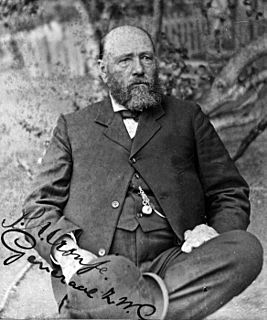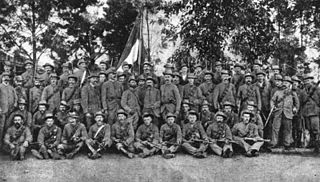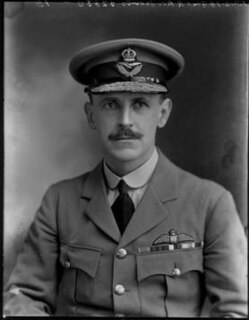Related Research Articles

The Second Boer War, also known as the Boer War, the Anglo–Boer War, or the South African War, was a conflict fought between the British Empire and the two Boer Republics over the Empire's influence in Southern Africa from 1899 to 1902. Triggered by the discovery of diamond and gold deposits in the Boer republics, the Boers launched successful attacks against British outposts in the opening stages of the war before being pushed back by imperial reinforcements. Though the British swiftly occupied the Boer republics, numerous Boers refused to accept defeat and engaged in guerrilla warfare. Eventually, British scorched earth policies brought the remaining Boer guerillas to the negotiating table, ending the war.

The Cape Colony, also known as the Cape of Good Hope, was a British colony in present-day South Africa named after the Cape of Good Hope. The British colony was preceded by an earlier corporate colony that became an original Dutch colony of the same name, which was established in 1652 by the Dutch East India Company (VOC). The Cape was under VOC rule from 1652 to 1795 and under rule of the Napoleonic Batavia Republic from 1803 to 1806.

The Union of South Africa was the historical predecessor to the present-day Republic of South Africa. It came into existence on 31 May 1910 with the unification of the Cape, the Natal, the Transvaal, and the Orange River colonies. It included the territories that were formerly a part of the South African Republic and the Orange Free State.

The first modern humans are believed to have inhabited South Africa more than 100,000 years ago. South Africa's prehistory has been divided into two phases based on broad patterns of technology namely the Stone Age and Iron Age. After the discovery of hominins at Taung and australopithecine fossils in limestone caves at Sterkfontein, Swartkrans, and Kromdraai these areas were collectively designated a World Heritage site. The first nations of South Africa are collectively referred to as the Khoisan, the Khoi Khoi and the San separately. These groups were displaced or sometimes absorbed by migrating Africans (Bantus) during the Bantu expansion from Western and Central Africa. While some maintained separateness, others were grouped into a category known as Coloureds, a multiracial ethnic group which includes people with shared ancestry from two or more of these groups: Khoisan, Bantu, English, Afrikaners, Austronesians, East Asians and South Asians. European exploration of the African coast began in the 13th century when Portugal committed itself to discover an alternative route to the silk road that would lead to China. In the 14th and 15th century, Portuguese explorers traveled down the west African Coast, detailing and mapping the coastline and in 1488 they rounded the Cape of Good Hope. The Dutch East India Company established a trading post in Cape Town under the command of Jan van Riebeeck in 1652, European workers who settled at the Cape became known as the Free Burghers and gradually established farms in the Dutch Cape Colony.

The Jameson Raid was a botched raid against the South African Republic carried out by British colonial administrator Leander Starr Jameson, under the employment of Cecil Rhodes. It involved 500 British South Africa Company police launched from Rhodesia (region) over the New Year weekend of 1895–96. Paul Kruger, whom Rhodes had a great personal hatred towards, was president of the South African Republic at the time. The raid was intended to trigger an uprising by the primarily British expatriate workers in the Transvaal but failed to do so. The workers were called the Johannesburg conspirators. They were expected to recruit an army and prepare for an insurrection; however, the raid was ineffective, and no uprising took place. The results included embarrassment of the British government; the replacement of Cecil Rhodes as prime minister of the Cape Colony; and the strengthening of Boer dominance of the Transvaal and its gold mines. The raid was a contributory cause of the Anglo-Boer War (1899–1902).

The Orange River Colony was the British colony created after Britain first occupied (1900) and then annexed (1902) the independent Orange Free State in the Second Boer War. The colony ceased to exist in 1910, when it was absorbed into the Union of South Africa as Orange Free State Province.

The Ossewabrandwag (OB) was an anti-British and pro-German organisation in South Africa during World War II, which opposed South African participation in the war. Pro-German Afrikaners formed the Ossewabrandwag in Bloemfontein on 4 February 1939.
Cape Dutch, also commonly known as Cape Afrikaners, were a historic socioeconomic class of Afrikaners who lived in the Western Cape during the eighteenth and nineteenth centuries. The terms have been evoked to describe an affluent, apolitical section of the Cape Colony's Afrikaner population which did not participate in the Great Trek or the subsequent founding of the Boer republics. Today, the Cape Dutch are credited with helping shape and promote a unique Afrikaner cultural identity through their formation of civic associations such as the Afrikaner Bond, and promotion of the Afrikaans language.

The Battle of Magersfontein was fought on 11 December 1899, at Magersfontein, near Kimberley, South Africa, on the borders of the Cape Colony and the independent republic of the Orange Free State. British forces under Lieutenant General Lord Methuen were advancing north along the railway line from the Cape to relieve the siege of Kimberley, but their path was blocked at Magersfontein by a Boer force that was entrenched in the surrounding hills. The British had already fought a series of battles with the Boers, most recently at Modder River, where the advance was temporarily halted.
Opposition to the Second Boer War occurred both within and outside of the British Empire. Among the British public, there was initially high levels of support for the war, though it declined considerably as the conflict dragged on. Internationally, condemnation of Britain came from many sources, predominately left-wing and anti-imperialist ones. Inside Britain influential groups, especially based in the opposition Liberal Party formed immediately. They fought ineffectually against the British war policies, which were supported by the Conservative Party of Prime Minister Salisbury.
South African resistance to war has a long tradition, and a history that includes conscientious objectors, pacifists, deserters and draft dodgers, as well as those whose objections are based upon the notion of "just war" as opposed to unjust or illegal war.

Boer foreign volunteers were participants who volunteered their military services to the Boers in the Second Boer War.

The QF 1 pounder, universally known as the pom-pom due to the sound of its discharge, was a 37 mm British autocannon, the first of its type in the world. It was used by several countries initially as an infantry gun and later as a light anti-aircraft gun.

Percy Alport Molteno was an Edinburgh-born South African lawyer, company director, politician and philanthropist who was a British Liberal Member of Parliament (MP) from 1906 to 1918.

Ohm Krüger is a 1941 German biographical film directed by Hans Steinhoff and starring Emil Jannings, Lucie Höflich, and Werner Hinz. It was one of a series of major propaganda films produced in Nazi Germany attacking the United Kingdom. The film depicts the life of the South African politician Paul Kruger and his eventual defeat by the British during the Boer War.
The South Africa Conciliation Committee was a British anti-war organisation opposed to the Second Boer War.
Boerehaat is an Afrikaans word that means "ethnic hatred of Boers" or Afrikaners as they became known after the Second Boer War. The related term Boerehater has been used to describe a person who hates, prejudices or criticises Boers or Afrikaners.

Brigadier-General Percy Robert Clifford Groves, was a senior British air strategist who served in the British Army and the Royal Air Force (RAF). He campaigned for substantial reform of Britain's approach to air strategy following the First World War, in particular for an immediate expansion of the RAF to parity with the largest European force within striking distance. He was an advocate of the aerial "knock out blow": the possibility of ending a war in its early stages by launching a massive attack on the enemy's centres of gravity.
Anti-imperialism in political science and international relations is a term used in a variety of contexts, usually by nationalist movements who want to secede from a larger polity or as a specific theory opposed to capitalism in Leninist discourse, derived from Vladimir Lenin's work Imperialism, the Highest Stage of Capitalism. Less common usage refers to opponents of an interventionist foreign policy.
References
- ↑ Biography of W.T. Stead, W.T. Stead and his "Books for the Bairns", Sally Wood-Lamont, Salvia Books, Edinburgh, 1987
- ↑ John Clifford Archived 2007-12-30 at the Wayback Machine , in A Dictionary of Methodism in Britain and Ireland, John Vickers
- 1 2 Davey, Arthur (1978). The British pro-Boers, 1877-1902. South Africa: Tafelberg. p. 220. ISBN 0-624-01200-X.
- ↑ Lowry, Donal (2000). The South African War reappraised. Manchester University Press. p. 174. ISBN 0-7190-5825-2.